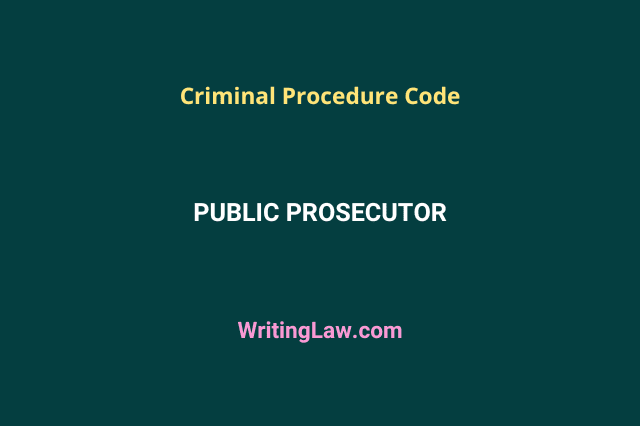
In this article, you will read about Public Prosecutors and the procedure of appointing a Public Prosecutor in India.
Introduction
In the criminal justice system, a Public Prosecutor (PP) is considered as the state’s agent representing the interests of the general public.
It is the state’s responsibility to prosecute the accused but not the responsibility of the party who suffered a loss personally (the aggrieved party).
Public Prosecutors are appointed in almost all countries. Section 24 of the Code of Criminal Procedure defines the Public Prosecutor. They act as the cornerstone of the Rule of Law, i.e. audi alteram partem (no person shall be condemned unheard).
Meaning of Public Prosecutor
Section 2(u) of the Code of Criminal Procedure contains the statutory definition of a Public Prosecutor. It states that a Public Prosecutor is someone appointed under section 24 of the CrPC. He takes part in both the investigation and the trial processes.
A Public Prosecutor is appointed to represent cases on behalf of the state in criminal trials.
Types of Prosecutors
Section 24 of the Criminal Procedure Code specifies three types of prosecutors:
- The central or state government appoints a prosecutor or additional prosecutors for a specific High Court.
- The central government appoints a prosecutor for the sole purpose of handling any case or proceeding in a local area.
- The state government appoints a prosecutor for each district that falls within its territorial limits.
Qualifications
To meet the primary requirement to become a Public Prosecutor, a person must have at least seven years of experience as a practising advocate in a court of law. And an Advocate with ten years of practice or more can also be appointed as a Special Public Prosecutor.
Eligibility to Become Public Prosecutor in India
- The appeal, trial, and all other court proceedings are handled by Public Prosecutors, who represent the government.
- A Public Prosecutor should be well-versed in all Indian laws. He should be an expert at thoroughly examining the cases.
- He must have experience gathering witnesses and pieces of evidence for any case.
- To become a Public Prosecutor, candidates must possess qualities such as persistence, persuasion, focus, and hard work, as well as excellent communication skills.
Procedure for Appointment
In consultation with the District Sessions Judge, the District Magistrate (The District Collector) prepares a list of names who are, in his opinion, found fit to be appointed as Public Prosecutors in the District. The State Government then appoints Public Prosecutors from the panel. He acts on behalf of the state to prove the guilt of the accused and to punish him. In simple, he tries to convict the accused.
Judicial Decisions Regarding Public Prosecutors
Tikam Singh vs State And Ors (2006)
In this case, it was held that the office of the Public Prosecutor is not in dispute, but it does have a public component to it. He represents the state but is not a complainant. The role of a Public Prosecutor differs from that of a private attorney.
Kunja Subudhi and Anr. vs Emperor (1928)
In this case, the court held that the responsibility of the Public Prosecutor is to provide all the relevant evidence to the court, whether it is favourable to or adverse to the accused, and to leave the matter up to the court to decide.
Conclusion
It is clear from the fact that the primary responsibility of the Public Prosecutor is to assist the court in determining the facts of the case. Almost all nations in the world adhere to the concept of the Public Prosecutor as one of the fundamental components of the criminal justice system. The Public Prosecutor must be unbiased, just, and truthful and follow all legal provisions. The ultimate objective behind his work is to achieve justice in a timely and equitable manner.
Read Next: Role of Public Prosecutor in India Under CrPC
- RG Anand vs Delux Films – Copyright Case Explained - 1st May 2024
- Justice KS Puttaswamy vs Union of India – Case Explained - 21st April 2024
- Vishaka vs State of Rajasthan – Case Explained - 19th April 2024







